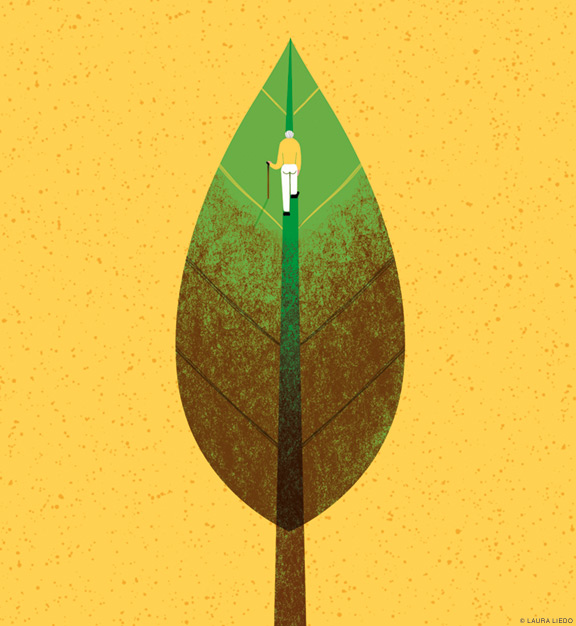
“I find it impossible not to wonder what’s left.”
By Nick Lyons
Picasso described his paintings as “the sum of destructions.” Aging can lean that way.
First, with new titanium hips, my doctor tells me that I must stop running and must never even do so much as jump rope. Then I fall: once, then twice, and before long a dozen times. And though I suffer only minimal injury, I know that’s just dumb luck and that the odds will grow much worse. I can remember Meryl Streep but not that actress—what’s her name?—who was in the movie I loved (but have forgotten), and that thin actor, you know, what’s his name. More and more friends and loved ones have died. Mari, my wife of 58 years, is gone and my eldest son, Paul, of melanoma. After the abject grief and sleepless nights, the dulling of my senses as if some parts of me have been smashed irretrievably, I worry that with so much lost I may have lost the capacity to love. The frequency of these defeats and casualties accelerated as I marched through my 80s, and now, nearing 90, I find it impossible not to wonder what’s left.
As it turns out, a lot.
Suddenly one summer afternoon a spark tingles my senses. It is tentative, elusive. Another life reaches out and touches mine. Just possibly, I think, something is left. Yet the weight of so much past experience cautions me: Probably not. This could easily lead to rejection, more loss. I am in dangerous territory. And it was such a little spark—does it merit faith, or action? Yet perhaps! It is impossible to know, and I feel a new kind of guardedness. Against my fears. Against myself. Is this mere dreaming, desperate hope? I think of bolting: saying with as much grace as I can muster, “It’s not you. I’m just not ready yet.”
I resolve to get up out of my chair and walk and talk more, not cling to the safe and moleish world of my desk. But it’s not easy after having spent decades learning the art of sitzfleisch, sitting still and trying to make a few words sing. My quiver had long been full of prepared excuses for not rising: I needed to finish a paragraph, I could not risk my fragile heart. I was nearing 90. So many other acts I once managed easily—throw a basketball, jump rope, pitch a fly to some recalcitrant trout—I simply could not do. Loving someone new was impossible.
Frankly, what spooked me was the very idea of turning 90. It was such a large and defining number. It possessed a numinous power to delete whatever gains had become a part of me. My limitations would only claim more territory, aggressively, becoming physical impossibilities. I would have to outwit the grim gray fellow who kept whispering “You cannot do this”—walk more, do at least a few more of those terrifically boring exercises.
But the present moment turns out to hold the same amount of possibility as it ever did.
When Ruth first took my hand, pressed it in a way that shot like electricity into my brain—when even our first dinner found us chatting like old pals—something in each of us was reaching out. And now the new and the unpredictable lie ahead. There’s something left in the romance department, even if, so unpracticed, I feel buffoonish. We inch closer, laughing a lot. We talk about books we read long ago, or last week, and either loved or hated. We speak about what our lives had been, what they were, and what would make each of us flourish now. We each enter into that strange world of the other’s memories.
We find that we can be together or apart, each with work of our own. Our world grows to include more children and grandchildren, my work and work of hers, new friends and circles of friends. We share connections to the throbbing universe, anger at rotten politicians, stark worry for the world, hope for some writing we both have done, some orchestration of the duet of geriatric flesh.
The loss of Mari, whom I had loved so deeply, brought pain that never ended. I live with her paintings and Paul’s essays etched into my brain, and my new life never thinks to let them go. Sometimes I call Ruth “Mari” but she, channeling the great wisdom of the East and gurus who encouraged her to become the person she is, never looks the other way as if waiting for those old loves to fade. We each of us had what we had. It was ours. It gave us life. Now we give each other life, and she helps those loves for Mari and Paul flourish.
And so I hobble my way through until my nose is pressed up close against an inescapable new decade. Nearing 90 I am flooded with a storm of memories, but also a temperament that has survived: unyielding, pliant, sensuous. I try not to fill my chest with too many hopes for too much, or worry about when more will be lost. But I hold tight claim to what I can still do and remember—at my new pace, at my desk, or anywhere. Ninety looms, but has become a minor marker on the arc of my life, the sum and challenge of a few last possibilities.
Nick Lyons W’53 has been a longtime contributor to theGazette.


i so enjoyed this article. the picture was wonderful and said so much. we need to see more of kind of writing.It is a little scary and yet so sweet.